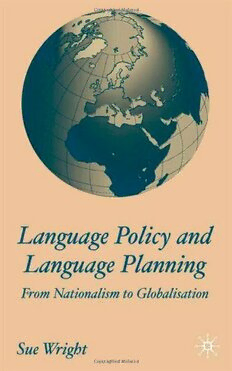
Language policy and language planning: from nationalism to globalisation PDF
322 Pages·2004·1.224 MB·
Most books are stored in the elastic cloud where traffic is expensive. For this reason, we have a limit on daily download.
Preview Language policy and language planning: from nationalism to globalisation
Description:
Language policy and planning is rarely just about language; it always has political, social and ethical dimensions. This is a comprehensive advanced textbook, covering not only language learning imposed by economic or political agendas, but also language choices entered into freely for reasons of social mobility, economic advantage or group identity. The first part of the book reviews the development and role of standard languages in the construction of national communities and identities. The second part examines the linguistic accommodation of groups in contact, major lingua francas and the case of "International English". The third section explores reactions to nationalism and globalization, with some attention to language rights.
See more
The list of books you might like
Most books are stored in the elastic cloud where traffic is expensive. For this reason, we have a limit on daily download.
